Peer Connections: Helping Your Child Build Friendships

Peer Connections: Helping Your Child Build Friendships
One significant aspect in the development of any child, regardless of their learning abilities, is fostering social connections and friendships. This journey to meaningful social connections can be more challenging for children with special needs or those identified as gifted. However, it’s far from impossible! As parents, there are numerous strategies you can implement to help your child build healthy friendships.
Let’s explore some effective techniques:
1. Establish a Safe and Encouraging Environment
Encourage open and positive communication in your home. Children should feel safe expressing their thoughts, fears, and joys about their experiences with friends. Whether they have had a positive interaction or are facing difficulties, meaningful conversations can lead to understanding and solutions. Remember, recognizing your child’s emotional reactions are a crucial part of the process.
2. Demonstrate Social Interactions
Help your child understand social cues by modeling social situations. You could use role-play scenarios at home, simulating both positive and potentially challenging social situations. This practice can be particularly beneficial for children on the autism spectrum who may struggle with social integration.
3. Use Tech to Teach Social Skills
In this digital era, technology can be a great assistant in teaching social skills. There are numerous apps designed to assist children with special needs and gifted learners in understanding social cues and emotions. Look at our comprehensive review of educational apps for more guidance.
4. Explore Structured Social Activities
Structured activities and groups provide natural opportunities for social interaction and friendship building. Adaptive sports programs and creative programs are a good starting point. They provide enjoyable platforms for children, including athletics for children with special needs and arts for young gifted artists.
5. Encourage Peer Interaction at School
Teachers can be your strongest allies in helping your child build friendships. Regular communication with teachers can keep you informed about classroom dynamics and peer interactions. An effective IEP process can also include objectives related to social skills and friendship building.
The path to friendship can have its bumps, but with love, patience, and the right approach, you can help your child navigate this journey. Bonding over shared interests and experiences forms the basis of lifelong friendships for all children regardless of their abilities. Keep learning, exploring, and remember – self-care for caregivers is crucial too. Together, we are stronger.